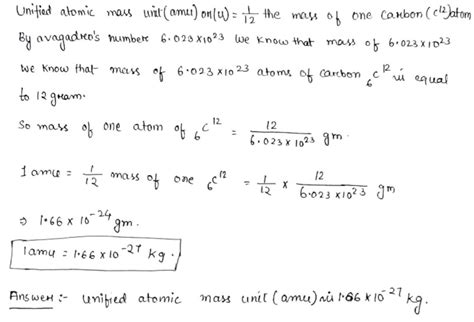Atomic Mass Unit To Kg

The atomic mass unit (amu) is a unit of mass used to express the mass of atoms and molecules. It is defined as one-twelfth the mass of a carbon-12 atom, which is approximately equal to 1.66053904 × 10^-27 kilograms. To convert atomic mass units to kilograms, a conversion factor is used, where 1 amu is equal to 1.66053904 × 10^-27 kg.
Understanding the Conversion Factor

The conversion factor between amu and kg is based on the definition of the amu and the absolute mass of the carbon-12 atom. This factor is used to convert the mass of atoms and molecules from amu to kg, allowing for calculations and comparisons in different units. The precise conversion factor is 1 amu = 1.66053904 × 10^-27 kg, which is a fundamental constant in physics and chemistry.
Calculation Example
To illustrate the conversion, consider an example where the mass of an atom is given as 12 amu, which is the mass of a carbon-12 atom. To convert this mass to kilograms, the conversion factor is applied: mass in kg = mass in amu × (1.66053904 × 10^-27 kg/amu). Substituting the given mass, we get mass in kg = 12 amu × (1.66053904 × 10^-27 kg/amu) = 1.99264685 × 10^-26 kg.
| Unit | Conversion Factor | Description |
|---|---|---|
| 1 amu | 1.66053904 × 10^-27 kg | Atomic mass unit to kilogram conversion |
| 1 kg | 6.02214076 × 10^26 amu | Kilogram to atomic mass unit conversion |

Key Points
- The atomic mass unit (amu) is defined as one-twelfth the mass of a carbon-12 atom.
- The conversion factor from amu to kg is 1.66053904 × 10^-27 kg/amu.
- This conversion is fundamental in calculating the mass of atoms and molecules in kilograms.
- Accurate conversion between amu and kg is essential in scientific research and applications.
- The conversion factor is based on the absolute mass of the carbon-12 atom, a fundamental constant in physics and chemistry.
Applications and Importance

The conversion between atomic mass units and kilograms has numerous applications in science and technology. In chemistry, it is used to calculate the mass of molecules and to determine the quantities of substances involved in chemical reactions. In physics, it is crucial for understanding the properties of matter at the atomic and subatomic level. The ability to convert between these units accurately is vital for experimental design, data analysis, and the interpretation of results in a wide range of scientific disciplines.
Historical Context and Evolution
The concept of the atomic mass unit has evolved over time, with its definition being refined as scientific understanding and measurement capabilities have improved. Initially, the amu was defined relative to the mass of hydrogen, but it was later redefined based on the mass of oxygen-16 and finally, in 1961, it was defined as one-twelfth the mass of a carbon-12 atom. This evolution reflects the increasing precision and understanding of atomic masses and the need for a universal standard that could be applied across different elements and compounds.
To address potential questions related to the conversion between atomic mass units and kilograms, the following FAQ section provides additional information and insights:
What is the significance of converting atomic mass units to kilograms?
+Converting atomic mass units to kilograms is significant because it allows scientists to express the mass of atoms and molecules in a unit that is universally understood and used across different scientific disciplines, facilitating comparisons and calculations.
How is the conversion factor between amu and kg derived?
+The conversion factor is derived from the definition of the amu as one-twelfth the mass of a carbon-12 atom and the absolute mass of the carbon-12 atom in kilograms, which is a fundamental constant determined through precise measurements.
What are the practical applications of knowing the conversion between amu and kg?
+Practical applications include calculating the mass of molecules, determining the quantities of substances in chemical reactions, and understanding the properties of matter at the atomic and subatomic level, which are essential in fields like chemistry, physics, and materials science.
In conclusion, the conversion between atomic mass units and kilograms is a fundamental aspect of scientific inquiry, particularly in chemistry and physics. Understanding this conversion and applying it accurately is crucial for a wide range of scientific calculations and applications. As science continues to evolve, the precision and relevance of this conversion will remain a cornerstone of scientific progress and discovery.



